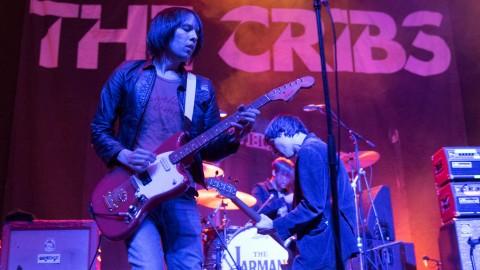
Historically, festivals – with their mud-wrestling, shared glitter pots, beige food offerings and distinct lack of showering facilities – have not been places you’d readily associate with cleanliness and good health. Combine close-quarters camping with many thousands of people descending upon a muddy field for a droplet-spraying sing-along, and you’ve got yourself an oven-ready recipe for COVID-19 – it’s the reason why virtually every single festival in the UK was forced to cancel in 2020.
- READ MORE: Government is “pushing live music off a cliff-edge” without pilot gig results or insurance
A year later, the situation looks a little different – more than 43 million people in the UK have now had their first dose of a vaccine, and anybody can get hold of lateral flow tests (which return test results in half an hour) by filling in a quick online form. Though putting on a festival in a pandemic remains a huge challenge, some pilot mass events have been able to go ahead with no restrictions on site this summer, thanks to COVID testing before and after the event. These pilot festivals form part of the Event Research Programme, which has been going on for some time. Back at the beginning of May, Liverpool hosted a Blossoms-headlined pilot gig, and a warehouse club night, alongside a number of other pilot schemes – also including The BRIT awards and the FA Cup final. Just this weekend, a smaller-scale version of Download went ahead with 10,000 camping punters. A negative test granted metal-lovers entry to a utopian festival without any need for social distancing at all.

Though the results from Download haven’t been looked at yet, scientists have already studied the various mass events which took place in early May. They found that, out of 58,000 participants across all of these different restriction-free events, just 15 people tested positive for COVID-19 afterwards. The findings could potentially be a groundbreaking lifeline for UK festivals, who have been hit hard by 15 months of postponements, cancellations, and unpaid bills. How did they keep numbers so low, pray tell? What kinds of measures should festivals be implementing in order to keep us safe after the lifting of restrictions on July 19? Well, here’s the thing – it’d be really fucking handy if the Government would actually pull their fingers out and share at least some of the results, wouldn’t it?
For fear of sounding like a coked-up old wizard wearing a bedazzled cape and holding court at Glastonbury’s stone circle, festivals are about far more than music, man. On a strictly practical level, they’re an exercise in advance planning, and putting one together is a logistical jigsaw puzzle that takes months to complete; building stages and booking bands is just the beginning. Behind the scenes, organisers need to recruit and train a small army of staff, wire in enough plumbing to cater to a modestly-sized town, and quite possibly hire out precautionary rescue dinghies in case people’s tents get swept away by the great British weather. And now, on top of that, any festival hoping to open its doors after July 19 will need to make sure it adheres to any new guidelines around mass gatherings with close social contact – which, knowing the whimsy of our government, could easily include anything from onsite testing facilities and social distancing, to clauses around providing a certain amount of scotch eggs, and exemptions for anybody travelling to the festival from Barnard Castle. Guidelines they haven’t even seen yet!
It’s the reason why several festivals have now been forced to cancel for a second year running, despite being scheduled for after the second, pushed-back version of so-called Freedom Day. Earlier this week, Kendall Calling directly blamed the delayed release of the findings from ERP for their cancellation in a statement. “Without this safety guidance, there are numerous aspects of the festival we cannot plan, and which could lay us wide open to last minute unforeseen regulations or requirements which could scupper an already built festival,” organisers wrote. Elsewhere, they called the lack of guidance an insult to the entire industry. Yesterday Truck festival – originally planned for July 23-25 – also cancelled in almost identical circumstances. “With the delay to the roadmap and without the necessary assurances and guidance from the Government, it’s become too risky for us to put the event on and deliver it to the high standard that you know, love and greatly deserve,” they wrote.

Without publishing proper guidelines and offering insurance for festivals that can no longer go ahead due to delays or restrictions, the Government is forcing countless organisers to make these difficult decisions: for many, it’s a tough choice between gambling huge sums of money on a festival that may not be able to go ahead, or cutting their losses and cancelling now. Though one festival, Bigfoot, managed to go ahead last weekend by adhering to stage three restrictions (cutting down to 4000 attendees and bringing in social distancing on-site), these kinds of restrictions just aren’t viable for larger-capacity festivals to bring in at incredibly short notice. Currently, the only way larger events can feasibly go ahead is if they’re part of the ERP’s incredibly unpublished research.
Perhaps you’d expect nothing less from the Tories, whose idea of a wild night out tends to involve popping a Rennie during ‘Land of Hope and Glory’ at Last Night of the Proms. Maybe they secretly view festivals, clubs and live venues as cesspits of moral depravity and hedonism that deserve shoving as far as possible down the priority pecking order. I mean, sure, there’s quite a bit of moral depravity along the way, but seeing your favourite band tear it up live is also one of the most amazing, life-affirming, transportive things about being a music fan.
Last year, the industry spoke continually about the importance of being able to stage live events this summer – but as things stand, we’re instead faced with the summer of selection. Majority of the UK’s live music pilots so far have been organised by the industry giants Festival Republic, and while Melvin Benn and his team have been working incredibly hard to stage safe events that will hopefully pave the way for the rest of the industry, the Government is yet to pass on any of the findings to the rest of the industry. July 19 is in just 26 days.
What, you have to ask, is the point of a pilot that doesn’t lead to anything else?
The post What’s the point of festival pilots if the Government won’t publish the results? appeared first on NME.



